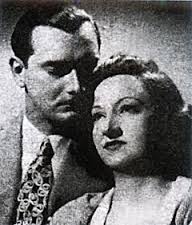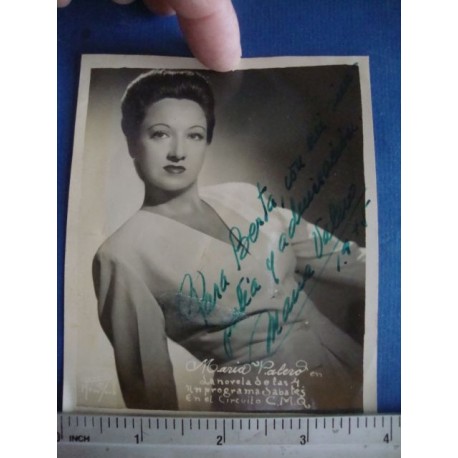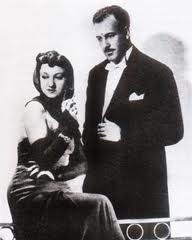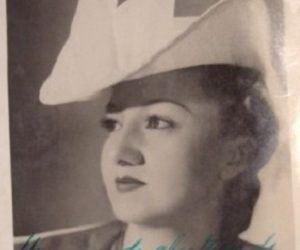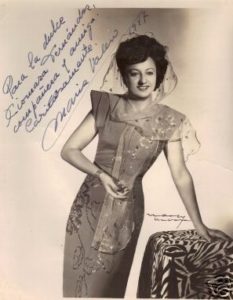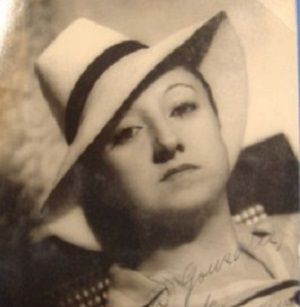 LA TRÁGICA MUERTE DE MARÍA VALERO “LA GRAN DAMA DE LA RADIO CUBANA.
LA TRÁGICA MUERTE DE MARÍA VALERO “LA GRAN DAMA DE LA RADIO CUBANA.
María de los Dolores Valero Sisteré. Fue una actriz española exiliada en Cuba al terminar la Guerra Civil Española, apodada como la ‘Gran Dama de la Radio Cubana’.
Desde que llega a Cuba en 1939, marca toda una época en radio cubana con las actuaciones en las novelas, ‘Doña Bárbara’, ‘El precio de una vida’ y ‘El derecho de nacer’, que la llevaron a despertar amplias simpatías entre los radioyentes criollos.
Desde que llega a Cuba otra leyenda nos acompaña en Febrero de 1939, cuando llega al puerto habanero El Flandre, un buque de bandera francesa, y confundida con los internacionalistas cubanos, una madrileña. La mujer que trae profundas heridas en el cuerpo y en el alma llega como una más, entre los cientos de refugiados nacionales y españoles que encuentran en el rincón caribeño la mano extendida de familiares y amigos, y el cariño de un pueblo solidario con la causa que ellos defendieron.
Cuba la acoge…, y su talento la convierte en la artista excepcional de las grandes obras en los Teatros Principal de la Comedia, América, Apolo…; la actriz más destacada de la radio en 1942, desde La novela del aire de la RHC Cadena Azul; y, entre 1944 y 1947, a través del Circuito CMQ, donde, al morir, protagoniza el capítulo 199 de la novela radial más trascendental de todos los tiempos en América: El derecho de nacer.
Cuando muere víctima de un absurdo accidente de tránsito, el 26 de noviembre de 1948, acumula el récord de protagonizar las dos novelas radiales con el rating insuperable del primer lugar nacional. Tanto cala en los corazones, que su recuerdo transita incólume a través de 70 años… Tanto, que al mencionar El derecho de nacer la remembranza solo se detiene en dos nombres, Félix B. Caignet, el autor, y María, la Gran Dama de la Radio Cubana.
SU TRAGICA MUERTE.
El actor Gaspar de Santelices era muy temido entre los compañeros del Circuito CMQ. Tenía fama de brujo, tomaba inesperadamente del brazo a quien tuviese más cerca y, aun cuando el sujeto se opusiese, le leía la palma de la mano, acertaba siempre en las predicciones.
En la tarde del 25 de noviembre de 1948, la actriz española conversaba con otros actores en uno de los pasillos de la emisora. Santelices pasó por el lado y le agarró una mano y le dijo:
“Cuidado, cuidado… Hay un accidente. “.
La actriz prefirió ignorar el comentario, sonrió y prosiguió la conversación con los amigos antes de perderse por los interiores del edificio. El tiempo apremiaba y debía prepararse, esa noche, a las ocho, salía al aire el capítulo 199 de la novela El derecho de nacer, en la que el personaje, Isabel Cristina, era uno de los puntos clave de la trama.
Llegó así la madrugada del 26 de noviembre de 1948, donde un cometa era perfectamente visible desde La Habana y la visión se hacía imponente e insuperable desde el Malecón habanero, a las cinco de la mañana, un grupo de actores, entre los que se encontraban la Valero, Eduardo Egea, Carmen Álvarez, Minín Bujones, Orlando García Noriega, Augusto Borges, Ana Sáenz, Myriam Acevedo y la pareja de baile Emilita y De Flores, quisieron vivir la experiencia, cruzaban la vía cuando ocurrió el accidente.
“Ella llevaba anudada al cuello una larga chalina que iba flotando en el aire. Cuando atraviesan la calle, pasó un auto por detrás, la chalina se enredó en las ruedas, y María cayó al suelo, golpeándose la cabeza contra el pavimento, lo cual le ocasionó la muerte inmediata”.
En el accidente es herida la bailarina Emilita, mientras el chofer del auto es obligado por la policía a trasladar el cuerpo, – ya sin vida – de María hacia la Casa de Socorros de la calle Corrales.
El cadáver fue expuesto en la funeraria Caballero, cita en 23 y M en el Vedado, allí los fotógrafos captaron la última imagen de la actriz, la mantilla negra que había traído de España le cubría la cabeza y parte del rostro maltratado por el accidente.
La despedida del duelo estuvo a cargo de Germán Pinelli ante una multitud enorme que colmaba todos los ámbitos del panteón en que fue enterrada ella, ante aquella montaña olorosa de flores, es María Valero, la refugiada española que se convirtió en la gran dama de la radio de Cuba.
Félix B. Caignet, el autor de El derecho de nacer, ofreció una conmovedora declaración a la prensa:
“Con María se ha muerto un gran pedazo sentimental de mi mismo. Porque de las entrañas de mi fantasma de autor, entre otros personajes de “El Derecho de Nacer” un día nació una muchacha linda y rubia, amorosa y rebelde, a quien en el Jordán de mi capricho, bauticé con el nombre de “Isabel Cristina del Castillo”. Tuvo por cima un script de radio y a pesar de haber nacido como un fruto lógico de una concepción idealista, no tenía vida, no tenía voz. Y fue entonces que le supliqué a María Valero que le diera su alma, su vida y su voz de maravilla a mi hija; sin voz, sin alma y sin vida”.
“¡Y el prodigio se hizo! Isabel Cristina del Castillo, la heroína del Derecho de Nacer, se humanizó. Tuvo vida, alma y voz, en la voz, el alma y la vida de María Valero, se realizó la divina amalgama del autor coincidiendo un tipo y la actriz genial impartiendo impecable encarnación. Y para mí como autor, y para el público oyente de la nación, María Valero llegó a ser una mujer más de nuestra Humanidad, que siente, ríe, llora y ama. “.
“Lo que nunca pude concebir fue que mi personaje romántico pudiera morirse. Todo lo concibió mi imaginación de autor; fingiendo de destrucción le había trazado una senda de dolor, para al final hacerla muy feliz, al fundirse su amor con el amor de Albertico Limonta, pero esta mañana al despertarme experimenté gran dolor, uno hacia al verla inmóvil sobre la cuna, script de radio, tal como naciera de mi entraña de autor; el cuerpo en sí, vida sin alma y sin objetivo de Isabel Cristina, la hija de mi fantasía. Y eso que la vida, el alma, la vida de María Valero se había ido para siempre de este mundo. “.
Maria Valero amaba a Cuba y a al pueblo cubano, de quien recibía tantas deferencias, pero ausente durante nueve años de España, anhelaba intensamente pasar unos meses en Madrid. Tenía entre los locos sueños, como los llamaba, tener una casa a orillas del Manzanares y otra en las riberas del Almendares.
Siempre que estrenaba una obra, la ofrecía a la memoria del padre, cuando hablaba de la familia, sobre todo de los fallecidos, mostraba profundo respeto y agradecimiento porque de ellos recibió los mejores ejemplos, la savia de la vida.
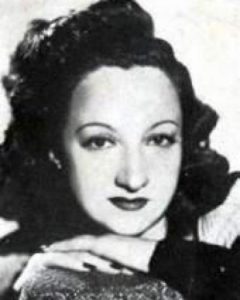 THE TRAGIC DEATH OF MARÍA VALERO “THE GREAT LADY OF THE CUBAN RADIO.
THE TRAGIC DEATH OF MARÍA VALERO “THE GREAT LADY OF THE CUBAN RADIO.
María de los Dolores Valero Sisteré. She was a Spanish actress exiled in Cuba at the end of the Spanish Civil War, nicknamed the ‘Great Lady of Cuban Radio’.
Since arriving in Cuba in 1939, he has marked an era in Cuban radio with the performances in the novels, ‘Doña Bárbara’, ‘El precio de una vida’ and ‘El derecho de nacer’, which led her to awaken wide sympathies between the criollo listeners.
Since arriving in Cuba, another legend accompanies us in February 1939, when a French-flagged ship arrives at Havana port El Flandre, and confused with the Cuban internationalists, a Madrid-born one. The woman who brings deep wounds to her body and soul comes as one of the hundreds of national and Spanish refugees who find in the Caribbean corner the extended hand of family and friends, and the affection of a people in solidarity with the cause that they defended.
Cuba welcomes her …, and her talent makes her the exceptional artist of the great works in the Principal Theaters of Comedy, America, Apolo …; the most outstanding actress of the radio in 1942, from La novela del aire de la RHC Cadena Azul; and, between 1944 and 1947, through the CMQ Circuit, where, when he dies, he stars in chapter 199 of the most transcendental radio novel of all time in America: The right to be born.
When he dies the victim of an absurd traffic accident, on November 26, 1948, he accumulates the record of starring in the two radio novels with the unbeatable rating of the first national place. So much cove in the hearts, that his memory transits unscathed through 70 years … So much, that when mentioning the right to be born the remembrance only stops in two names, Felix B. Caignet, the author, and Maria, the Great Lady of Cuban Radio
HER TRAGIC DEATH.
The actor Gaspar de Santelices was very feared among the comrades of the CMQ Circuit. He had a reputation as a sorcerer, he unexpectedly took the arm of those closest to him and, even when the subject objected, read the palm of his hand, always guessed right in the predictions.
On the afternoon of November 25, 1948, the Spanish actress talked with other actors in one of the corridors of the station. Santelices went by the side and grabbed a hand and said:
“Careful, careful … There is an accident.”
The actress preferred to ignore the comment, smiled and continued the conversation with friends before getting lost in the interior of the building. Time was pressing and should be prepared, that night, at eight o’clock, the 199th chapter of the novel El derecho de nacer was released, in which the character, Isabel Cristina, was one of the key points of the plot.
It arrived like this the dawn of the 26 of November of 1948, where a comet was perfectly visible from Havana and the vision became imposing and insurmountable from the Malecón habanero, to the five of the morning, a group of actors, between whom they were La Valero, Eduardo Egea, Carmen Álvarez, Minín Bujones, Orlando García Noriega, Augusto Borges, Ana Sáenz, Myriam Acevedo and the dance couple Emilita and De Flores, wanted to live the experience, crossing the road when the accident occurred.
“She had a long scarf tied around her neck, and when they crossed the street, a car ran behind her, the scarf got tangled in the wheels, and Maria fell to the ground, hitting her head on the pavement, which it caused him immediate death. ”
In the accident the dancer Emilita is wounded, while the driver of the car is forced by the police to move the body, – now lifeless – of María to the Casa de Socorros on Calle Corrales.
The body was exposed at the Caballero funeral home, at 23 and M in Vedado, where the photographers captured the last image of the actress, the black mantilla that she had brought from Spain covered her head and part of the face mistreated by the accident.
The farewell of the duel was in charge of Germán Pinelli before a huge crowd that filled all areas of the pantheon in which she was buried, before that mountain fragrant with flowers, is María Valero, the Spanish refugee who became the great lady of the Cuba radio.
Félix B. Caignet, the author of El derecho de nacer, offered a moving statement to the press:
“With María a great sentimental piece of myself has died, because from the entrails of my author’s ghost, among other characters of” El Derecho de Nacer “one day a pretty and blonde, loving and rebellious girl was born, the Jordán of my whim, I baptized with the name of “Isabel Cristina del Castillo.” He had a radio script on top and despite being born as a logical fruit of an idealistic conception, he had no life, he had no voice. I begged Maria Valero to give her soul, her life and her voice of wonder to my daughter, without voice, without soul and without life “.
“And the prodigy was made!” Isabel Cristina del Castillo, the heroine of the Right to Be Born, was humanized She had life, soul and voice, in the voice, soul and life of María Valero, the divine amalgam of the author was realized coinciding a guy and the great actress imparting impeccable incarnation, and for me as an author, and for the audience listener of the nation, María Valero became one more woman of our Humanity, who feels, laughs, cries and loves. ”
“What I could never conceive was that my romantic character could die, everything was conceived by my imagination as an author, pretending to destroy it had traced a path of pain, in order to make her very happy, by merging her love with the love of Albertico Limonta , but this morning when I woke up I experienced great pain, one towards watching her immobile over the cradle, radio script, as it was born from my author’s womb, the body itself, life without soul and without objective of Isabel Cristina, the daughter of my fantasy, and that the life, the soul, the life of María Valero was gone forever from this world. ”
Maria Valero loved Cuba and the Cuban people, from whom she received so many deferences, but absent for nine years from Spain, intensely longed to spend a few months in Madrid. He had among the crazy dreams, as he called them, to have a house on the banks of the Manzanares and another on the banks of Almendares.
Whenever he premiered a work, he offered it to the father’s memory, when he spoke of the family, especially of the deceased, he showed profound respect and gratitude because he received the best examples of them, the sap of life.
Agencies/ Wiki/Ecured/ Josefa Bracero/ Extractos/ Excerpts/ YouTube/ Vevo/ Internet Photos/ Arnoldo Varona/ www.TheCubanHistory.com
THE CUBAN HISTORY, HOLYWOOD.



